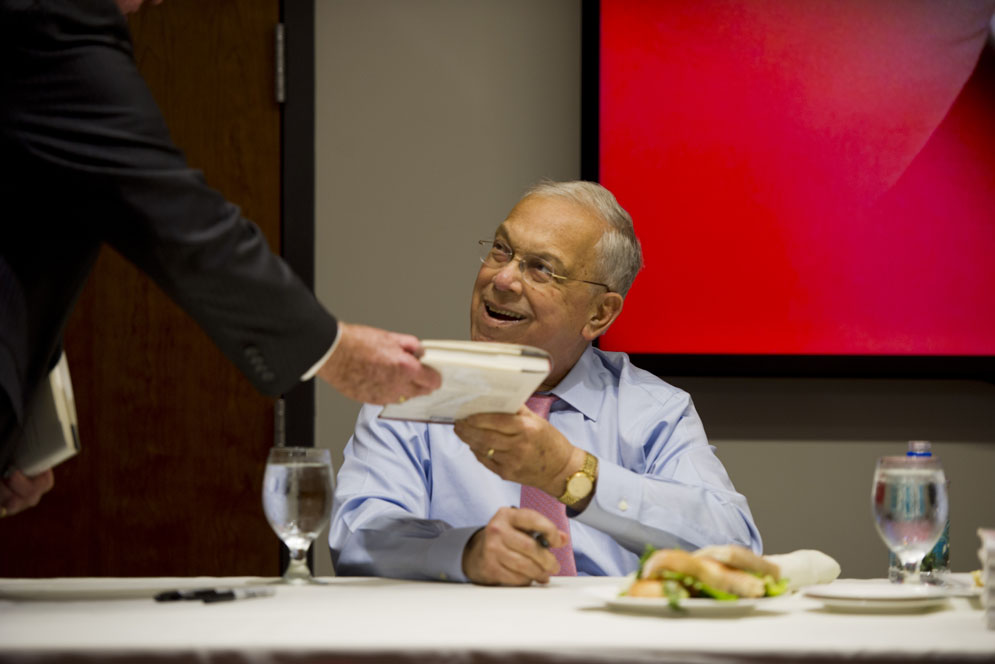Thomas M. Menino, who was mayor of Boston from 1993 to 2014 as well as a longtime friend to Boston University, died on October 30, 2014, at Brigham and Women’s Hospital, a week after announcing his decision to stop treatment for the cancer that he’d been battling for almost a year.
His death at age 71 came just nine months after the popular, pragmatic, five-term mayor settled in at BU to codirect the newly established Initiative on Cities (IoC), a research center and think tank devoted to improving all aspects of urban government. On Menino’s brief watch, the IoC hosted seminars on issues ranging from architecture to climate change, and it released the first-ever academic survey of the nation’s mayors.
Menino (Hon.’01) was the “Cal Ripken of Boston politics: durable, consistent, respected,” says John Carroll, a College of Communication assistant professor of mass communication. “And like Ripken’s, Menino’s streak will never be duplicated.”
Whether it was leading the Caribbean Day parade along Blue Hill Avenue, welcoming a diverse and exuberant opera audience to “CAH-men on the Common,” or struggling out of a wheelchair after leaving his hospital bed to address President and Mrs. Obama and 2,000 others at a memorial at Boston’s Cathedral of the Holy Cross on April 18, 2013, three days after the Boston Marathon bombings, Menino was the people’s mayor.

It didn’t take long for the former mayor to feel at home in his new BU office on Bay State Road. Photo by Cydney Scott
“Boston has lost one of its greats,” says BU President Robert A. Brown. “We were fortunate during Tom Menino’s long, transformative tenure as mayor to work closely with him and his team in City Hall on projects and initiatives that were vital to Boston University and that contributed to Boston’s emergence as an exceptionally dynamic center of research and innovation.”
Menino was a College of Arts & Sciences political science professor of the practice as well as codirector of the IoC.
“We knew Tom was a great mayor during his time as mayor,” says Brown. “We had the privilege—for all-too-brief a span of time—of having him as a member of our faculty.”
Menino was a distinctly unprodigal son of Hyde Park, the boy who never left home. He was the son of a factory foreman for Westinghouse who aspired for his son to get a college degree. But after taking night classes at Boston College while selling insurance, Menino dropped out, informing his dad that the man he idolized, Harry Truman, didn’t go to college, either. A generation later, he outdid his hero. While representing Hyde Park on the city council, he earned a bachelor’s degree from the University of Massachusetts, Boston. He received an honorary degree from BU in 2001, and at the 2013 Commencement ceremony was awarded the Boston University Medallion for his service to the community.

President Robert A. Brown (far right), assisted by BU trustee Alan Leventhal (Hon.’09) (left), presents Menino with the Boston University Medallion for his service to the community at BU’s 2013 Commencement. Photo by Chitose Suzuki
In his memoir, Mayor for a New America, written with Jack Beatty, Menino recalls that the 5,000 friends and supporters attending his first inaugural party were entertained by what he calls “the representatives of the New America”—multiracial, multicultural, LGBT-friendly—“rising in the old city.” Among the entertainers were a Roma band, gay two-steppers, a Spanish theater group, and a Chinese lion dance. He was committed, as he put it, “to lifting the cloud of racism over the city” that had hovered in the wake of Boston’s painful busing crisis of the 1970s. Celtics legend Bill Russell (Hon.’02) remarked in 2004 that under Menino’s leadership, “We see a Boston that is making every effort to be one of our country’s most inclusive and progressive cities.”
Menino was one of the first elected officials in the country to endorse gay marriage. As he viewed the 2013 Gay Pride parade from his wheelchair on the sidelines, a gay woman approached him, teared up, and told him she’d moved to Boston years before after her parents disowned her. She thanked him for making her feel that her new city welcomed her. Menino would later write in his memoir, “As I battle cancer, her words bring me contentment.”
















































Related Stories
Former Mayor Thomas Menino a Welcome Addition to BU
Two decades of hands-on leadership seen as invaluable asset
Former Mayor Menino Diagnosed with Cancer
“We’ll get through this,” vows codirector of BU’s Initiative on Cities
Menino Suspends Cancer Treatment
Will spend time with family
Post Your Comment